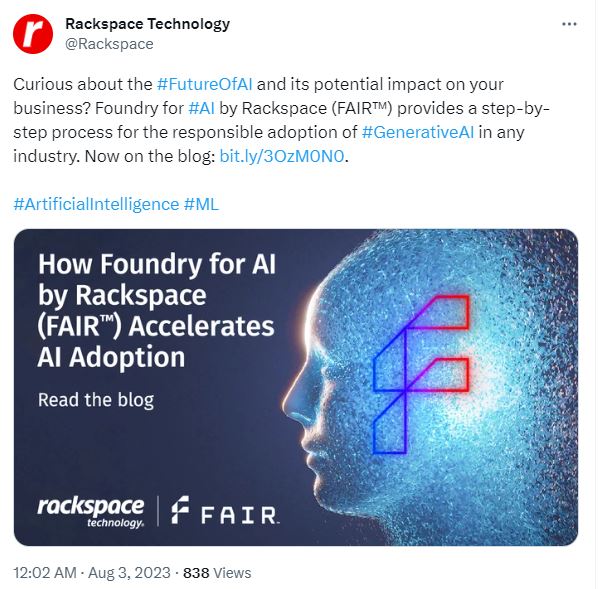
Businesses in Asia are increasing their adoption of generative AI technology. (Image – Shutterstock)
Asian businesses see better opportunities despite complexities for generative AI
|
Getting your Trinity Audio player ready... |
Artificial intelligence (AI) is currently the most popular technology in the world. Everyone’s talking about it. For businesses investing in technology, AI is a priority.
According to Dharmendra (DK) Sinha, President of Public Cloud Business Unit at Rackspace Technology, Asia is seeing one of the fastest adoptions in AI technology. Part of the reason for this is due to the lack of legacy infrastructure that enables businesses to quickly adapt AI.
At the same time, AI regulations in Asia are still nascent. Currently, there are only frameworks in place that enable businesses to trial more use cases and see which works best for them.
However, understanding how to work best with AI technology is one of the biggest challenges. In fact, there can be some complexities when implementing generative use cases in the cloud.
As such, Rackspace Technology unveiled Foundry for Generative AI by Rackspace (FAIR) to address these concerns. FAIR is a tool that would enable businesses to better understand generative AI use cases and implement them in their applications.
Rackspace Technology’s FAIR generative AI offerings to drive customer success include:
- FAIR Generative AI Ideation Workshop: An interactive and collaborative ideation workshop that helps organizations uncover actionable use cases for generative AI with defined business impacts. AI readiness diagnostics provide critical considerations for successful AI adoption.
- FAIR Generative AI Incubate: An agile and iterative program that co-creates an enterprise’s first generative AI solution. It establishes the technology stack and assesses the viability of AI, ensuring seamless integration into organizational processes.
- FAIR Generative AI Industrialize: A systematic effort to transform the AI solution into a product, implementing governance, defining metrics, and optimizing the AI model and Distributed Cloud Infrastructure for continuous improvement.

A Tweet by Rackspace Technology on FAIR.
For Shwetank Sheel, Director of Global Data Presales and Solutions at Rackspace Technology, there are both complexities and opportunities for generative AI in the cloud.
“In the multi-cloud environment, you have to have a certain amount of overhead as well as organizational maturity to understand how to use the cloud in a structured and secure manner. This is where conversations on enterprise-scale landing zones, zero trust and AI-ready architectures take place.
For example, if using multi-cloud, a business needs to look at working with AI technology that can work for both AWS and Azure. They need to have guiding principles about how they ensure which AI workload or which model scenario to use one versus the other. They also need to ensure how they optimize data transfer, access and such across the different clouds,” said Sheel.
For Sheel, as a multi-cloud provider, Rackspace Technology has the deep capabilities to help businesses set up secure landing zones and data sharing across the clouds. What this means is there are certain kinds of capabilities that some AI models can do better than other models. For example, there could be there’s certain tasks that AWS Bedrock can do better than OpenAI.
“This puts us at the intersection of being able to advise the customer about what combination of foundation models, either close source from the hyperscalers or open source externally, can be leveraged, depending on where they are in their journey and what their current stack is.
There are always challenges associated with the multi-cloud. This is the core of our expertise from a multi-cloud perspective, and that allows us to ensure that we are able to offer the best of capabilities across the different models and investments that all of the hyperscalers,” he added.
Generative AI, technology and customers
Given that Asia is seeing increasing adoption of generative AI, Martin Dubé, Asia Pacific and Japan (APJ) Vice President of Sales at Rackspace Technology pointed out that when businesses think about AI technology, they got to think about how they can get the best out of their investment.
As a technology provider, Rackspace Technology also needs to be able to help the customer understand which areas they really want to address. At the same time, businesses want to expedite the process and be competitive in the market.
The problem with this is the data could be sitting in different areas in the multi-cloud. Therefore, in order to get a generative AI engine to run, businesses need to be able to collect and go after the data that they’re looking for. They need to start at the front end to understand what processes they are trying to expedite and how they would use generative AI to be competitive.
“What we see in the market today is that businesses in a certain vertical, whereby they are adopting generative AI to be faster, and able to address needs for their customer faster than their competitors. Put simply, it is extracting all the data they can get, the right information in their environment in a secure manner and able to address that in,” explained Dube.
An interesting point highlighted by Dube is businesses should be careful when adopting generative AI, especially if they just upload it into an environment without knowing which server the information is being exposed to.
“When we work with a customer, we also make sure we’ve got the right trust engine running in place. Be it Azure, AWS, or others, it’s actually in the customers’ environment, running in terms of the hyperscaler running in a trusted environment. That’s quite a key point to start at the beginning,” he said.
This is where FAIR serves its purpose best. Rackspace Technology is applying fairness and governance to the models they’re using. This includes having transparency on how it is trained and also being clear about which models are being used – be it specific Azure models or different types of open-source models.
Put simply, FAIR accelerate secure, responsible, and sustainable adoption of generative AI solutions across industries. FAIR aims to be a force multiplier to accelerate the pragmatic and secure use-case-based adoption of generative AI in businesses across all industries.
Acknowledging that they are not the only experts in generative AI, Sinha does believe that Rackspace Technology has figured out how to work with the broader ecosystem to help their clients. Sinha also believes that the ones who will succeed in this space are the ones who work with a partner ecosystem and evolve the solution.
“We believe that generative AI is going to help our clients think through differently about their core business. This can lead to many more follow on projects for us where we can help our clients with data and security. It’s not just a solution as such, because, at the end of it, there is a lot that generative AI writes.”
“There are a lot of underlying pillars of data such as how clean is the data security in connectivity with other systems and all that. We believe this is a great opportunity for us to help our clients go through this journey, and help them reimagine and redefine their businesses. And this means a good amount of business for us as we move forward as well,” concluded Sinha.
READ MORE
- Safer Automation: How Sophic and Firmus Succeeded in Malaysia with MDEC’s Support
- Privilege granted, not gained: Intelligent authorization for enhanced infrastructure productivity
- Low-Code produces the Proof-of-Possibilities
- New Wearables Enable Staff to Work Faster and Safer
- Experts weigh in on Oracle’s departure from adland


